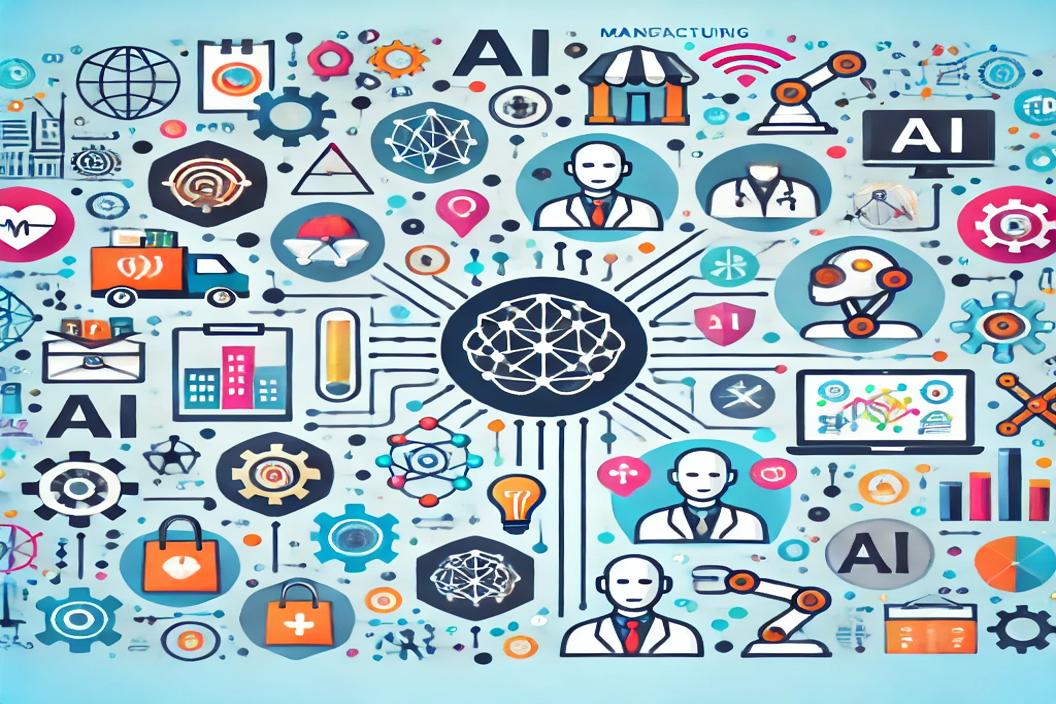Table of Contents
Predict How AI Will Affect Different Industries
Artificial Intelligence (AI) is revolutionizing industries across the globe, promising unprecedented advancements and transforming the way businesses operate. This blog post delves into the profound impact of AI on various sectors, drawing insights from recent studies and expert analyses.
The Influence of Artificial Intelligence on Different Industries
1. Healthcare
AI is making significant strides in the healthcare industry, offering innovations that enhance patient care and streamline administrative processes. Key advancements include:
- Diagnostics and Treatment: Artificial Intelligence algorithms can analyze medical images and data with remarkable accuracy, aiding in early detection of diseases like cancer. Machine learning models predict patient outcomes, helping doctors tailor personalized treatment plans.
- Telemedicine: Artificial Intelligence-powered chatbots and virtual assistants provide initial consultations, reducing the burden on healthcare professionals and improving accessibility for patients.
- Drug Discovery: Artificial Intelligence accelerates the drug discovery process by predicting how different compounds interact with targets, significantly reducing the time and cost involved in bringing new drugs to market.
2. Finance
In the finance sector, Artificial Intelligence is reshaping the landscape by enhancing efficiency, reducing risks, and improving customer experiences:
- Fraud Detection: Artificial Intelligence systems analyze transaction patterns in real-time, identifying fraudulent activities and preventing financial losses.
- Algorithmic Trading: Artificial Intelligence-driven trading algorithms process vast amounts of data at high speed, executing trades with precision and optimizing investment strategies.
- Customer Service: AI chatbots and virtual assistants provide personalized financial advice, answer customer queries, and streamline banking operations.
3. Retail
The retail industry is leveraging AI to enhance customer experiences, optimize supply chains, and increase sales:
- Personalized Shopping: AI analyzes customer preferences and behavior to offer personalized product recommendations, enhancing the shopping experience and boosting sales.
- Inventory Management: AI-powered systems predict demand trends, optimize stock levels, and reduce waste by ensuring that inventory matches consumer needs.
- Customer Insights: AI tools analyze customer feedback and social media interactions, providing retailers with valuable insights to improve products and services.
4. Manufacturing
AI is revolutionizing manufacturing processes by increasing efficiency, reducing costs, and improving product quality:
- Predictive Maintenance: AI monitors equipment performance in real-time, predicting failures before they occur and scheduling maintenance to minimize downtime.
- Quality Control: AI-driven inspection systems detect defects in products with high precision, ensuring consistent quality and reducing waste.
- Automation: AI-powered robots and automation systems handle repetitive tasks, allowing human workers to focus on more complex and creative aspects of manufacturing.
5. Education
In the education sector, AI is transforming how students learn and how educators teach:
- Personalized Learning: AI analyzes students’ learning patterns and adapts educational content to suit their individual needs, providing a tailored learning experience.
- Administrative Efficiency: AI streamlines administrative tasks such as grading, scheduling, and student enrollment, allowing educators to focus more on teaching.
- Virtual Classrooms: AI-powered platforms enable interactive and immersive virtual learning experiences, making education accessible to students worldwide.
The Challenges and Ethical Considerations
While AI offers numerous benefits, it also presents challenges and ethical concerns that must be addressed:
- Job Displacement: AI automation could lead to job losses in certain sectors. It is crucial to develop strategies for workforce reskilling and upskilling to mitigate this impact.
- Bias and Fairness: AI systems can inherit biases from the data they are trained on, leading to unfair outcomes. Ensuring transparency and fairness in AI algorithms is essential.
- Privacy and Security: The use of AI involves the collection and analysis of large amounts of data, raising concerns about privacy and data security. Robust measures are needed to protect sensitive information.
AI is set to revolutionize various industries, offering transformative benefits and driving innovation. However, it is essential to address the associated challenges and ethical considerations to ensure that AI development and deployment are aligned with societal values and goals. By embracing AI responsibly, industries can harness its full potential to create a more efficient, equitable, and prosperous future.
For a deeper dive into how AI will affect different industries, visit Trreta’s Blog.
More blogs: https://sleepingsirens.com

